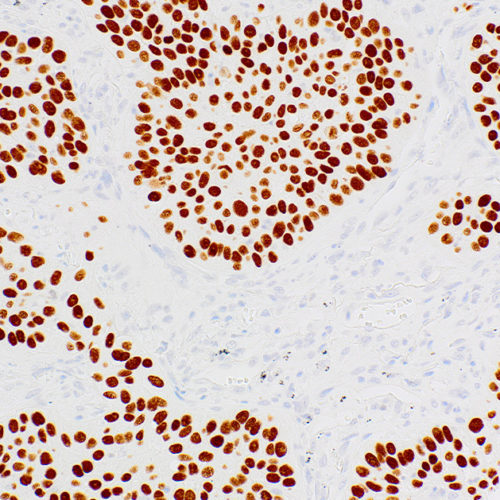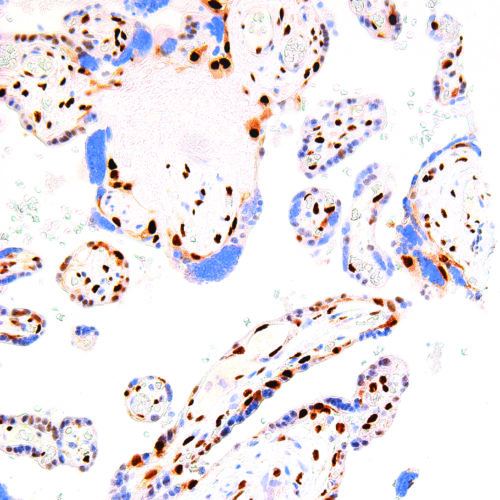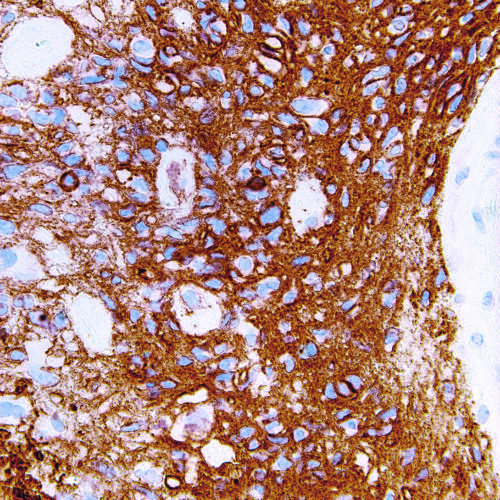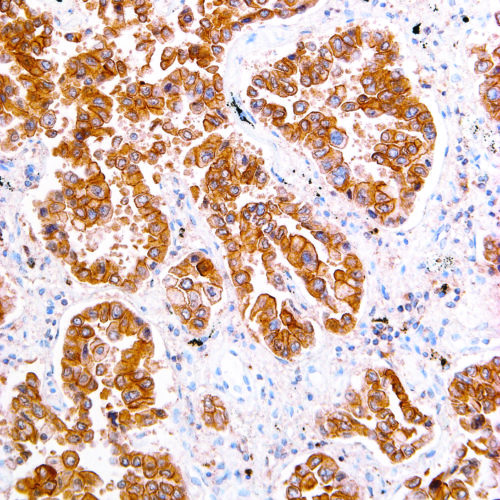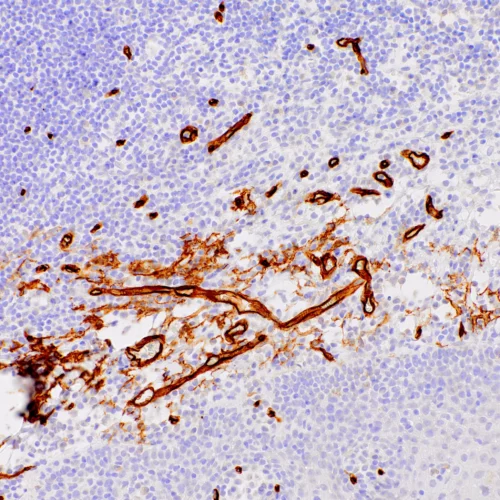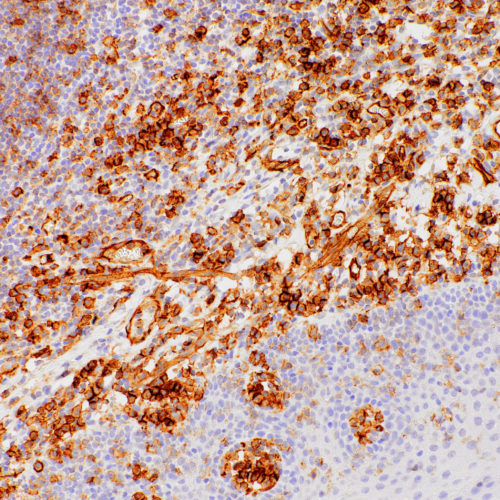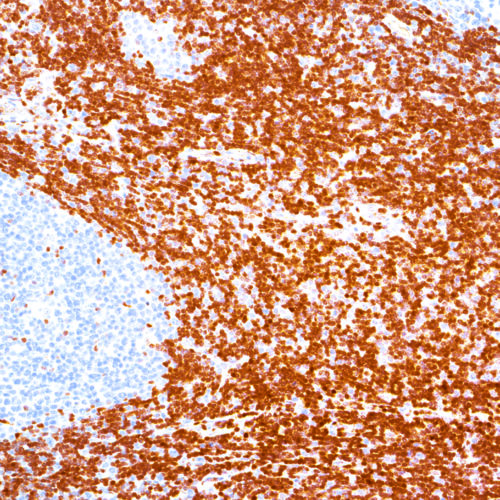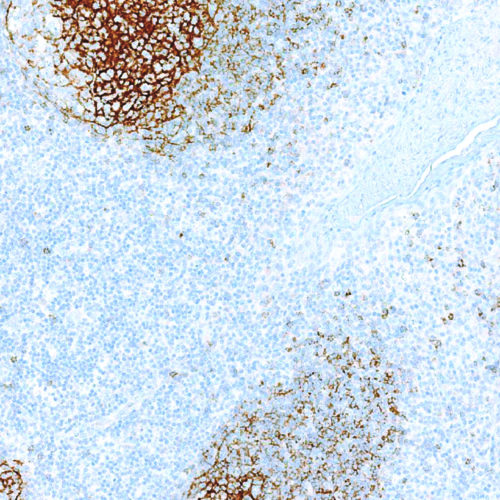High quality products to support Pathologists and Biological and Environmental Scientists
GeneAb™ p40
$145.00 – $560.00Anti-p40 recognizes squamous and basal cells, the shortest variant of p53, and ΔNp63 (an isoform of p63). p40 has been indicated as an alternative to p63 for the detection of Squamous Cell Carcinoma (SqCC), offering the advantage of eliminating potential misinterpretation of a positive adenocarcinoma as a SqCC.
GeneAb™ p57 kip2
$115.00 – $860.00p57Kip2, also known as p57, is a tumour suppressor protein that causes cell cycle arrest at G1 by binding to G1 cyclin-CDK complexes. The p57Kip2 gene is a potential tumour suppressor target as the gene is located in a chromosomal region implicated in sporadic cancers, Wilms’ tumour, and Beckwith Wiedemann syndrome. Anti-p57Kip2 labels many cytotrophoblast nuclei and stromal cells in normal placenta, and is useful in differentiating between complete hydatidiform mole and partial hydatidiform mole or hydropic abortion.
GeneAb™ CD56
$50.00 – $160.00Cluster of Differentiation 56 (CD56), also known as Neural-Cell Adhesion Molecule (NCAM), is a glycoprotein involved in synaptic plasticity, cell-cell adhesion, neurite outgrowth, learning, and memory. NCAM is expressed in normal neurons, glia, natural killer cells, activated T-cells, brain and cerebellum, neuroendocrine tissues, and skeletal muscle. Anti-CD56 recognizes a number of tumours including myeloma, myeloid leukemia, natural killer/T-cell lymphomas, neuroendocrine tumours, pancreatic acinar-cell carcinoma, pheochromocytoma, and Wilm’s tumour. CD56 is detectable in neoplasms that are neuroectodermally-derived, such as retinoblastoma, medulloblastomas, astrocytomas, small cell carcinomas, and neuroblastomas. It has also been linked to rhabdomyosarcoma, a tumour that is mesodermally-derived.
GeneAb™ ROS1
$190.00 – $855.00ROS1 serves as a receptor tyrosine kinase. Gene rearrangement events involving ROS1 have been described in lung and other cancers, and such tumours have been found to be remarkably responsive to small molecule tyrosine kinase inhibitors. Multiple studies have observed ROS1 gene rearragement events in approximately 1% of lung cancers and showed that inhibition of tumour cells bearing ROS1 gene fusions by crizotinib or other ROS1 tyrosine kinase inhibitors was effective in vitro.
GeneAb™ CD34
$66.00 – $385.00Cluster of Differentiation 34 (CD34) is a transmembrane glycoprotein expressed on hematopoietic stem and progenitor cells, vascular endothelium, embryonic fibroblasts, and rare glial cells in nervous tissue. CD34 is the most used marker for characterizing blasts in leukemia. CD34 is also present in some soft tissue tumours including solitary fibrous tumours and gastrointestinal stromal tumours. Proliferating endothelial cells seem to upregulate CD34 expression. Although specificity is low, Anti-CD34 reacts positively with more than 85% of angiosarcoma and Kaposi’s sarcoma.
GeneAb™ CD31
$75.00 – $305.00Cluster of Differentiation 31 (CD31) is present on hematopoietic stem cells (HSCs), and its expression is used to determine the concentration of HSCs in research studies and for bone marrow transplantation. Anti-CD31 is very specific and sensitive for endothelial cells and does not stain non-vascular tumours, therefore CD31 staining is used to recognize the vascular origins of neoplasms.
GeneAb™ p27
$100.00 – $370.00p27, also known as p27Kip1, is a cyclin-dependent kinase inhibitor that binds to and inhibits cyclin-dependent kinases, thereby regulating progression from G1 to S phase. Decreased expression of p27 is linked to poor prognosis in renal cell carcinoma, colon carcinoma, small breast carcinomas, non-small cell lung carcinoma, hepatocellular carcinoma, multiple myeloma, lymph node metastases in papillary carcinoma of the thyroid, and is associated with a more aggressive phenotype of carcinoma in the cervix.
GeneAb™ CD23
$105.00 – $315.00Cluster of Differentiation 23 (CD23) is found on interleukin-4 activated B-cells, activated macrophages, eosinophils, and follicular dendritic cells, and is a receptor for IgE, an antibody involved in parasitic immunity. CD23 is present on Reed-Sternberg cells in Hodgkin’s disease. Follicular dendritic cells and activated B-lymphocytes produce strong staining in germinal centers and weak patterns in mantle zone B-cells. CD23 is helpful in differentiating chronic lymphocytic leukemia from mantle cell leukemia. Small B-cell lymphomas are sometimes positive, while precursor B- and T-lymphomas, myeloid neoplasms, and mature T-cell lymphomas stain negatively with Anti-CD23.
